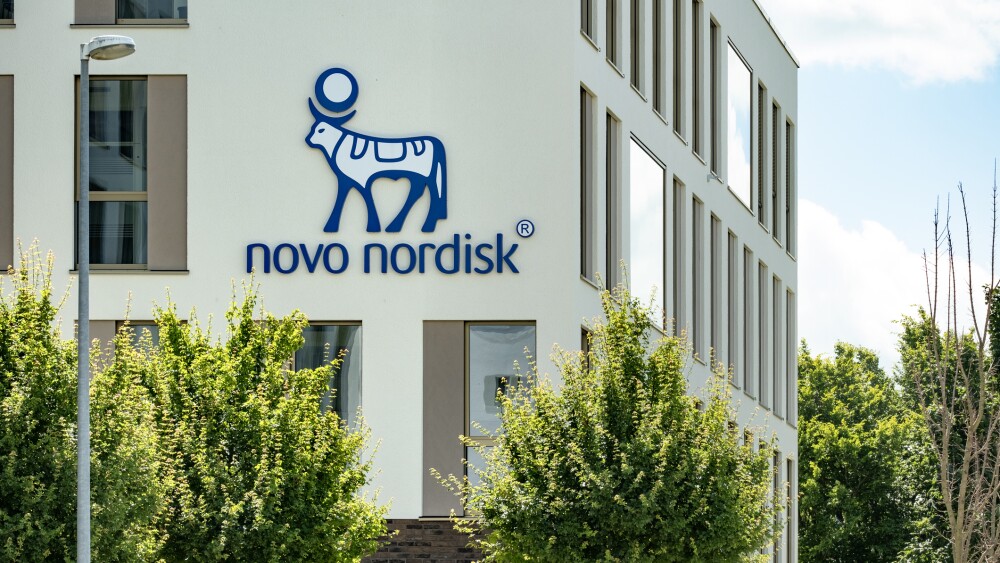FARXIGA is the first SGLT2 inhibitor to show meaningful benefit in patients with chronic kidney disease in a trial including both type-2 diabetics and non-diabetics

FARXIGA is the first SGLT2 inhibitor to show meaningful benefit in patients with chronic kidney disease in a trial including both type-2 diabetics and non-diabetics
WILMINGTON, Del.--(BUSINESS WIRE)-- The Dapagliflozin And Prevention of Adverse outcomes in Chronic Kidney Disease (DAPA-CKD) Phase III trial for FARXIGA (dapagliflozin) in patients with chronic kidney disease (CKD) will be stopped early following a recommendation from an independent Data Monitoring Committee (DMC) based on its determination of overwhelming efficacy.
The decision to stop the trial early was made following a routine assessment of efficacy and safety which showed FARXIGA’s benefits earlier than originally anticipated and AstraZeneca will now initiate closure of the trial.
Mene Pangalos, Executive Vice President, BioPharmaceuticals R&D, said: “Chronic kidney disease patients have limited treatment options, particularly those without type-2 diabetes. We are very pleased the Data Monitoring Committee concluded that patients experienced overwhelming benefit. FARXIGA has the potential to change the management of chronic kidney disease for patients around the world.”
The co-chairs of the trial and its Executive Committee Prof. David Wheeler, University College London, and Prof. Hiddo L. Heerspink, University Medical Center Groningen, said: “It has been a privilege to be involved in this trial. We are delighted with the Data Monitoring Committee recommendation and look forward to sharing the results with the medical community and patients with chronic kidney disease.”
The primary endpoint of DAPA-CKD is a composite of worsening of renal function or death (defined as a composite endpoint of ≥50% sustained decline in estimated glomerular filtration rate (eGFR), onset of end stage renal disease (ESRD) or cardiovascular (CV) or renal death) in patients with CKD irrespective of the presence of type-2 diabetes (T2D).
The full results will be submitted for presentation at a forthcoming medical meeting and AstraZeneca will now initiate discussions with global health authorities regarding early regulatory submissions.
In August 2019, the US Food and Drug Administration (FDA) granted Fast Track designation for the development of FARXIGA to delay the progression of renal failure and prevent CV and renal death in patients with CKD. In January 2020, following positive data for the landmark Phase III DAPA-HF Trial, the US Food and Drug Administration (FDA) accepted a supplemental New Drug Application (sNDA) and granted Priority Review for FARXIGA to reduce the risk of CV death or the worsening of Heart failure (HF) in adults with heart failure with reduced ejection fraction (HFrEF) with and without Type-2 diabetes. The Prescription Drug User Fee Act date, the FDA action date for this supplemental application, is scheduled for the second quarter of 2020.
FARXIGA is indicated as an adjunct to diet and exercise to improve glycemic control in adults with T2D. In the US it is also approved to reduce the risk of hospitalization for HF in patients with T2D and established CV disease or multiple CV risk factors.
Indication and Limitations of Use for FARXIGA® (dapagliflozin) tablets
FARXIGA is indicated:
- as an adjunct to diet and exercise to improve glycemic control in adults with type 2 diabetes mellitus
- to reduce the risk of hospitalization for heart failure in adults with type 2 diabetes mellitus and established cardiovascular disease or multiple cardiovascular risk factors
FARXIGA is not recommended for patients with type 1 diabetes mellitus or for the treatment of diabetic ketoacidosis.
Important Safety Information for FARXIGA® (dapagliflozin) tablets
Contraindications
- Prior serious hypersensitivity reaction to FARXIGA
- Severe renal impairment (eGFR <30 mL/min/1.73 m2), end-stage renal disease, or patients on dialysis
Warnings and Precautions
- Hypotension: FARXIGA causes intravascular volume contraction, and symptomatic hypotension can occur. Assess and correct volume status before initiating FARXIGA in patients with impaired renal function, elderly patients, or patients on loop diuretics. Monitor for hypotension
- Ketoacidosis has been reported in patients with type 1 and type 2 diabetes receiving FARXIGA. Some cases were fatal. Assess patients who present with signs and symptoms of metabolic acidosis for ketoacidosis, regardless of blood glucose level. If suspected, discontinue FARXIGA, evaluate and treat promptly. Before initiating FARXIGA, consider risk factors for ketoacidosis. Patients on FARXIGA may require monitoring and temporary discontinuation in situations known to predispose to ketoacidosis
- Acute Kidney Injury: FARXIGA causes intravascular volume contraction and can cause acute kidney injury. Reports of acute kidney injury requiring hospitalization and dialysis have occurred with FARXIGA. If acute kidney injury occurs, discontinue and promptly treat
Increases in serum creatinine and decreases in eGFR may be observed with initiation of FARXIGA. Elderly patients and patients with impaired renal function may be more susceptible to these changes. Consider temporarily discontinuing in settings of reduced oral intake or fluid losses
Before initiating FARXIGA, evaluate renal function and monitor periodically
FARXIGA is not recommended when the eGFR is <45 mL/min/1.73 m 2 - Urosepsis and Pyelonephritis: SGLT2 inhibitors increase the risk for urinary tract infections [UTIs] and serious UTIs have been reported with FARXIGA. Evaluate for signs and symptoms of UTIs and treat promptly
- Hypoglycemia: FARXIGA can increase the risk of hypoglycemia when coadministered with insulin and insulin secretagogues. Consider lowering the dose of these agents when coadministered with FARXIGA
- Necrotizing Fasciitis of the Perineum (Fournier’s Gangrene): Rare but serious, life-threatening cases have been reported in patients receiving SGLT2 inhibitors including FARXIGA. Cases have been reported in females and males. Serious outcomes have included hospitalization, surgeries, and death. Assess patients presenting with pain or tenderness, erythema, swelling in the genital or perineal area, along with fever or malaise. If suspected, institute prompt treatment and discontinue FARXIGA
- Genital Mycotic Infections: FARXIGA increases the risk of genital mycotic infections, particularly in patients with prior genital mycotic infections. Monitor and treat appropriately
Adverse Reactions
In a pool of 12 placebo-controlled studies, the most common adverse reactions (≥5%) associated with FARXIGA 5 mg, 10 mg, and placebo respectively were female genital mycotic infections (8.4% vs 6.9% vs 1.5%), nasopharyngitis (6.6% vs 6.3% vs 6.2%), and urinary tract infections (5.7% vs 4.3% vs 3.7%).
Use in Specific Populations
- Pregnancy: Advise females of potential risk to a fetus especially during the second and third trimesters.
- Lactation: FARXIGA is not recommended when breastfeeding.
Dosing
- To improve glycemic control in patients with T2D, the recommended starting dose of FARXIGA is 5 mg once daily, taken in the morning. In patients tolerating FARXIGA 5 mg once daily who require additional glycemic control, the dose can be increased to 10 mg once daily.
- To reduce the risk of hospitalization for heart failure in patients with T2D, the recommended dose of FARXIGA is 10 mg once daily.
Please see accompanying US Full Prescribing Information and Medication Guide for FARXIGA.
Notes
Chronic kidney disease
CKD can be a serious, progressive condition defined by decreased kidney function (shown by reduced eGFR or markers of kidney damage, or both, for at least three months.) The most common causes of CKD are diabetes and hypertension and glomerulonephritis. CKD is associated with significant patient morbidity and an increased risk of CV events, such as HF and premature death. In its most severe form, known as ESRD, kidney damage and deterioration of kidney function have progressed to the stage where dialysis or kidney transplantation are required. The majority of patients with CKD will die from CV causes before reaching ESRD.
DAPA-CKD
DAPA-CKD is an international, multi-centre, randomised, double-blinded trial in 4,245 patients designed to evaluate the efficacy of FARXIGA 10mg, compared with placebo, in patients with CKD stages 2–4 and elevated urinary albumin excretion, with and without T2D. FARXIGA is given once daily in addition to standard of care. The primary composite endpoint is worsening of renal function (defined as a composite of an eGFR decline ≥50%, onset of ESKD and death from CV or renal cause). The trial is being conducted in 21 countries. The efficacy-stopping guideline in the trial protocol and DMC Charter state that after evaluating the totality of the available efficacy and safety data, the DMC may consider recommending that the study be stopped for overwhelming efficacy.
AstraZeneca in CV, Renal & Metabolism (CVRM)
CV, renal and metabolism together form one of AstraZeneca’s main therapy areas and a key growth driver for the Company. By following the science to understand more clearly the underlying links between the heart, kidneys and pancreas, AstraZeneca is investing in a portfolio of medicines to protect organs and improve outcomes by slowing disease progression, reducing risks and tackling co-morbidities. Our ambition is to modify or halt the natural course of CVMD diseases and potentially regenerate organs and restore function, by continuing to deliver transformative science that improves treatment practices and CV health for millions of patients worldwide.
AstraZeneca
AstraZeneca is a global, science-led biopharmaceutical company that focuses on the discovery, development and commercialization of prescription medicines, primarily for the treatment of diseases in three therapy areas - Oncology, Cardiovascular, Renal & Metabolism and Respiratory. AstraZeneca operates in over 100 countries and its innovative medicines are used by millions of patients worldwide. For more information, please visit www.astrazeneca-us.com and follow us on Twitter @AstraZenecaUS.
View source version on businesswire.com: https://www.businesswire.com/news/home/20200330005322/en/
Media Inquiries
Michele Meixell +1 302 885 2677
Chelsea Ford +1 302 885 2677
Source: AstraZeneca
View this news release online at:
http://www.businesswire.com/news/home/20200330005322/en





